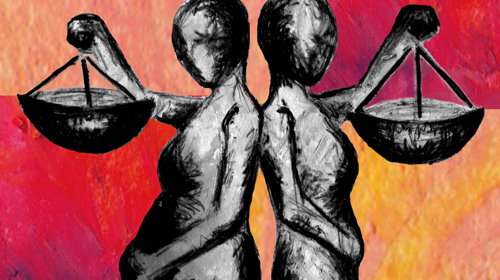
Across the country teachers at religiously affiliated schools are being fired for their reproductive choices. What’s worse, the schools are unapologetic, claiming they have the right to discriminate because of their religious beliefs.
Emily Herx, a former Language Arts and Literature teacher at St. Vincent de Paul, a Catholic School in Indiana, was fired after she requested time off to receive in vitro fertilization (IVF) treatment. She is suing the school for sex and disability discrimination in federal court, and today we filed a friend-of-the court brief to support her legal arguments. A few states over, Jane Doe (a pseudonym), an employee at a Catholic school in Missouri, was fired for becoming pregnant outside of wedlock. Today the ACLU of Kansas & Western Missouri filed a complaint on Jane’s behalf with the Equal Employment Opportunity Commission for sex discrimination.
Both Emily and Jane were dedicated to their jobs and received outstanding reviews. They were both lay employees, who did not perform any religious or ministerial duties. They were both excited to share the news with their employers that they were expanding their families. And they were both fired simply because of their reproductive decisions.
St. Vincent’s pastor told Emily she was a “grave, immoral sinner” and it would cause a “scandal” if others learned that she used IVF treatment. The president of Jane’s school told her that he was worried about others people’s perceptions about her pregnancy and demanded that she begin working from home starting in June (during her second trimester) and take an unpaid leave of absence starting at the end of the school year in July through January 2013. Although Jane’s school verbally promised that Jane would be able to keep her health insurance during her leave of absence, they refused to put this promise in writing.
It would be illegal for almost any employer to fire an employee who is (or is trying to become) pregnant. But in these cases, the schools are arguing that they are entitled to discriminate because they are a religiously affiliated school. That is flat out wrong. When it comes to employees like Emily and Jane, who have absolutely no religious duties or responsibilities, it is always illegal for religiously affiliated employers to discriminate on the basis of sex, race, national origin, or disability. Because only women can become pregnant, these schools discriminated against Emily and Jane on the basis of their sex. St. Vincent also discriminated against Emily on the basis of her disability when it fired her for using IVF, a medical treatment that addresses Emily’s disability of infertility.
We’ve said it before and we’ll keep saying it—religious freedom does not come with a license to discriminate on the basis of sex, race, national origin, or disability. Period. The First Amendment protects our right to believe whatever we want and to act on those beliefs, unless those actions harm others. We live in a diverse society and the freedom to believe what you want comes with the responsibility to respect other people’s rights and beliefs, as well. Just as restaurant owners in the 1960s were required to serve African-Americans despite their religious opposition to racial integration, and religious schools were required to pay male and female teachers equally, even though they believed the Bible considers men the head of the household, schools like St. Vincent cannot fire Emily and Jane because of their pregnancies, even if they believe IVF treatment or pregnancy outside of wedlock are sins.
Unfortunately, Emily and Jane are not alone. In Ohio, Christa Dias was fired by a religious school for using artificial insemination to become pregnant. In Florida, Jarretta Hamilton was fired by a religious school for becoming pregnant outside of marriage. In both of these cases the school argued their religious rights give them a free pass to discriminate. Fortunately, courts have disagreed.
Discrimination is discrimination, no matter what the reasoning. And it’s always illegal.
Learn more about the use of religion to discriminate: Sign up for breaking news alerts, follow us on Twitter, and like us on Facebook.

